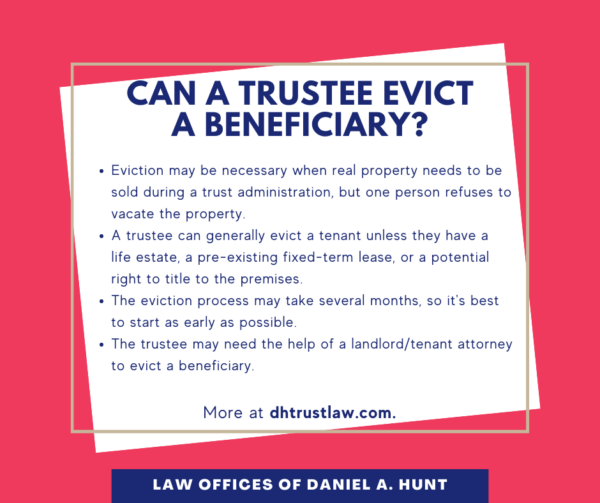Can a Trustee Evict a Beneficiary?

During a trust administration, some successor trustees encounter a difficult situation where a beneficiary is living in the trust residence and will not leave. Often this beneficiary is a family member of the decedent and was living there before the parent’s death. Other times, a beneficiary may move into the trust residence after the parent passes away.
Can a trustee evict a beneficiary? In most cases, a trustee is the legal owner of the real property and can evict a tenant, including a beneficiary. Here’s when and how a trustee can evict a beneficiary.
When Can a Trustee Evict a Beneficiary?
A family home is often the most valuable asset in a revocable living trust. Most of the time, the home must be cleaned out and sold so the trust assets can be distributed to the beneficiaries. If one of the beneficiaries is living in the house and refuses to leave, this person may impede the progress of the trust administration. This is when eviction may become necessary.
After the settlor’s death, no one may live in the trust property without paying rent to the trust, unless the trust terms state otherwise. A trustee has a duty to deal impartially with all beneficiaries, to take control of and preserve the trust property, and to make the trust property productive. Allowing a tenant to live in the home when it needs to be sold may be a violation of these trustee duties.
When Can’t a Trustee Evict a Beneficiary?
While the trustee generally has the power to evict a tenant from real estate held in the trust, there are certain exceptions. For example, if the trust leaves a life estate to one individual, the trustee cannot evict them from the property.
A life estate is a form of ownership that allows one person to live in or on a piece of real property until they pass away. At their death, the real property passes to the remainder owner(s) who take legal ownership of the property immediately upon the death of the last life tenant.
Additionally, if the beneficiary has a pre-existing fixed-term lease and is not in breach of the lease agreement, then the trustee has to honor the lease and cannot evict the beneficiary without cause. Also, if the beneficiary has a potential right to title to the premises, then the trustee may not be able to evict.
Consult with an experienced trust litigation attorney if you’re unsure whether you can evict a beneficiary or not.
How to Evict a Beneficiary
If a trustee decides to evict a beneficiary, the process may take several months to complete, so it’s best to start as early as possible to avoid delaying the trust administration. In general, the steps to this process are:
- The trustee must send a written notice to the beneficiary to vacate the real property. Under California law, if the beneficiary has been in possession of the property for less than a year, then a 30-day notice is sufficient. If they’ve been in possession for more than one year, then a 60-day notice is required. Note that California law requires that both a 30-day and 60-day notice contain specific required language to be valid.
- If the beneficiary does not vacate within the specified time period, the trustee can file forms in court to start an eviction case. They may wish to hire a landlord/tenant attorney who is experienced in handling eviction cases, also known as unlawful detainers.
- If the tenant files a court form to tell their side of the story, the trustee can request a trial date. If the tenant doesn’t, the trustee can obtain a default judgment against the tenant without a trial.
- If the case goes to trial, the judge will hear both parties and make a decision. If the trustee wins their case, the beneficiary will need to move out and possibly pay back any attorney fees and unpaid rent. If the trustee loses, then the beneficiary can stay in the home.
What If the Beneficiary Breaches an Agreement?
What can you do if the beneficiary was under an agreement to pay rent (or give services in lieu of rent) and they breach their agreement? In this case, the trustee may serve a 3-day notice to pay the rent owed or vacate the property.
Additionally, if the beneficiary has a rental agreement in place and they breach a provision in the agreement, then the trustee may also serve a 3-day notice to either fix the situation or vacate the property. A few common examples of breaches of a rental agreement include failure to pay a late fee for rent that was paid after the due date, failing to pay utility bills, or failing to perform other responsibilities listed under the lease.
When dealing with a difficult beneficiary, it’s important to have an experienced trust litigation attorney on your side. If you have any questions about a trustee evicting a beneficiary, feel free to contact our office.
Law Offices of Daniel A. Hunt
The Law Offices of Daniel A. Hunt is a California law firm specializing in Estate Planning; Trust Administration & Litigation; Probate; and Conservatorships. We've helped over 10,000 clients find peace of mind. We serve clients throughout the greater Sacramento region and the state of California.




